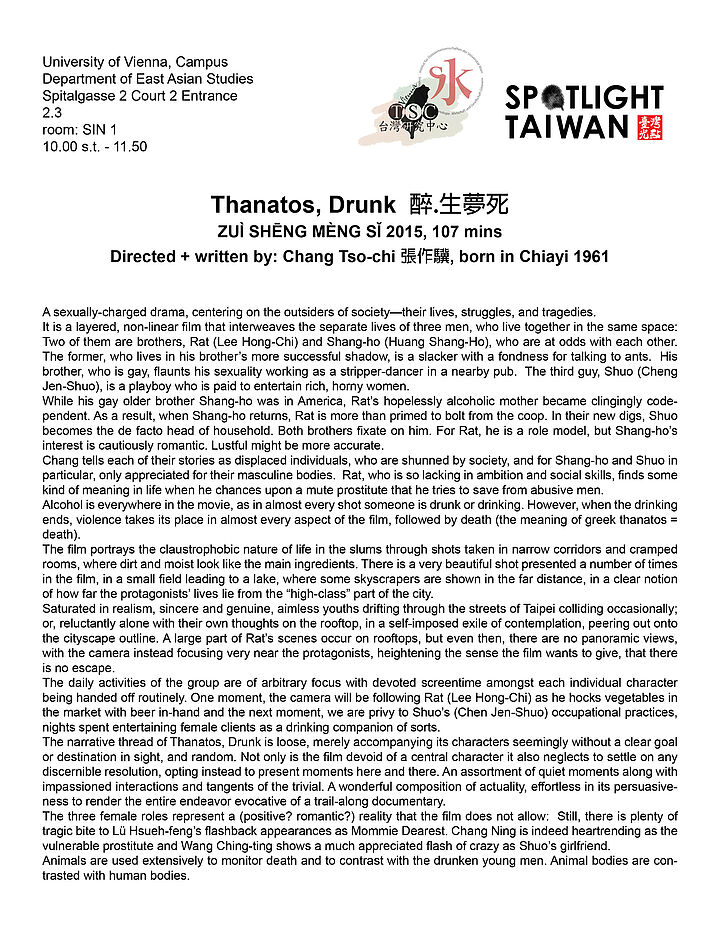Samstag, 11. Mai 2019, 10:00 - 12:00 iCal
Thanatos Drunk
Taiwanese Film (English subtitles)
SIN 1, Department of East Asian Studies
Spitalgasse, 2 Hof 2 Aufgang 2.3, 1090 Wien
Kultur
Thanatos, Drunk 醉.生夢死
ZUÌ SHĒNG MÈNG SǏ 2015, 107 mins
Directed + written by: Chang Tso-chi 張作驥, born in Chiayi 1961
A sexually-charged drama, centering on the outsiders of society—their lives, struggles, and tragedies.
It is a layered, non-linear film that interweaves the separate lives of three men, who live together in the same space:
Two of them are brothers, Rat (Lee Hong-Chi) and Shang-ho (Huang Shang-Ho), who are at odds with each other.
The former, who lives in his brother’s more successful shadow, is a slacker with a fondness for talking to ants. His
brother, who is gay, flaunts his sexuality working as a stripper-dancer in a nearby pub. The third guy, Shuo (Cheng
Jen-Shuo), is a playboy who is paid to entertain rich, horny women.
While his gay older brother Shang-ho was in America, Rat’s hopelessly alcoholic mother became clingingly codependent.
As a result, when Shang-ho returns, Rat is more than primed to bolt from the coop. In their new digs, Shuo
becomes the de facto head of household. Both brothers fixate on him. For Rat, he is a role model, but Shang-ho’s
interest is cautiously romantic. Lustful might be more accurate.
Chang tells each of their stories as displaced individuals, who are shunned by society, and for Shang-ho and Shuo in
particular, only appreciated for their masculine bodies. Rat, who is so lacking in ambition and social skills, finds some
kind of meaning in life when he chances upon a mute prostitute that he tries to save from abusive men.
Alcohol is everywhere in the movie, as in almost every shot someone is drunk or drinking. However, when the drinking
ends, violence takes its place in almost every aspect of the film, followed by death (the meaning of greek thanatos =
death).
The film portrays the claustrophobic nature of life in the slums through shots taken in narrow corridors and cramped
rooms, where dirt and moist look like the main ingredients. There is a very beautiful shot presented a number of times
in the film, in a small field leading to a lake, where some skyscrapers are shown in the far distance, in a clear notion
of how far the protagonists’ lives lie from the “high-class” part of the city.
Saturated in realism, sincere and genuine, aimless youths drifting through the streets of Taipei colliding occasionally;
or, reluctantly alone with their own thoughts on the rooftop, in a self-imposed exile of contemplation, peering out onto
the cityscape outline. A large part of Rat’s scenes occur on rooftops, but even then, there are no panoramic views,
with the camera instead focusing very near the protagonists, heightening the sense the film wants to give, that there
is no escape.
The daily activities of the group are of arbitrary focus with devoted screentime amongst each individual character
being handed off routinely. One moment, the camera will be following Rat (Lee Hong-Chi) as he hocks vegetables in
the market with beer in-hand and the next moment, we are privy to Shuo’s (Chen Jen-Shuo) occupational practices,
nights spent entertaining female clients as a drinking companion of sorts.
The narrative thread of Thanatos, Drunk is loose, merely accompanying its characters seemingly without a clear goal
or destination in sight, and random. Not only is the film devoid of a central character it also neglects to settle on any
discernible resolution, opting instead to present moments here and there. An assortment of quiet moments along with
impassioned interactions and tangents of the trivial. A wonderful composition of actuality, effortless in its persuasiveness
to render the entire endeavor evocative of a trail-along documentary.
The three female roles represent a (positive? romantic?) reality that the film does not allow: Still, there is plenty of tragic bite to Lü Hsueh-feng’s flashback appearances as Mommie Dearest. Chang Ning is indeed heartrending as the vulnerable prostitute and Wang Ching-ting shows a much appreciated flash of crazy as Shuo’s girlfriend.
Animals are used extensively to monitor death and to contrast with the drunken young men. Animal bodies are contrasted with human bodies.
Zur Webseite der Veranstaltung
Veranstalter
Vienna Center for Taiwan Studies
Kontakt
Astrid Lipinsky
Vienna Center for Taiwan Studies
Institut für Ostasienwissenschaften
4277 43844
astrid.lipinsky@univie.ac.at
Erstellt am Donnerstag, 09. Mai 2019, 15:02
Letzte Änderung am Dienstag, 14. Mai 2019, 10:59

